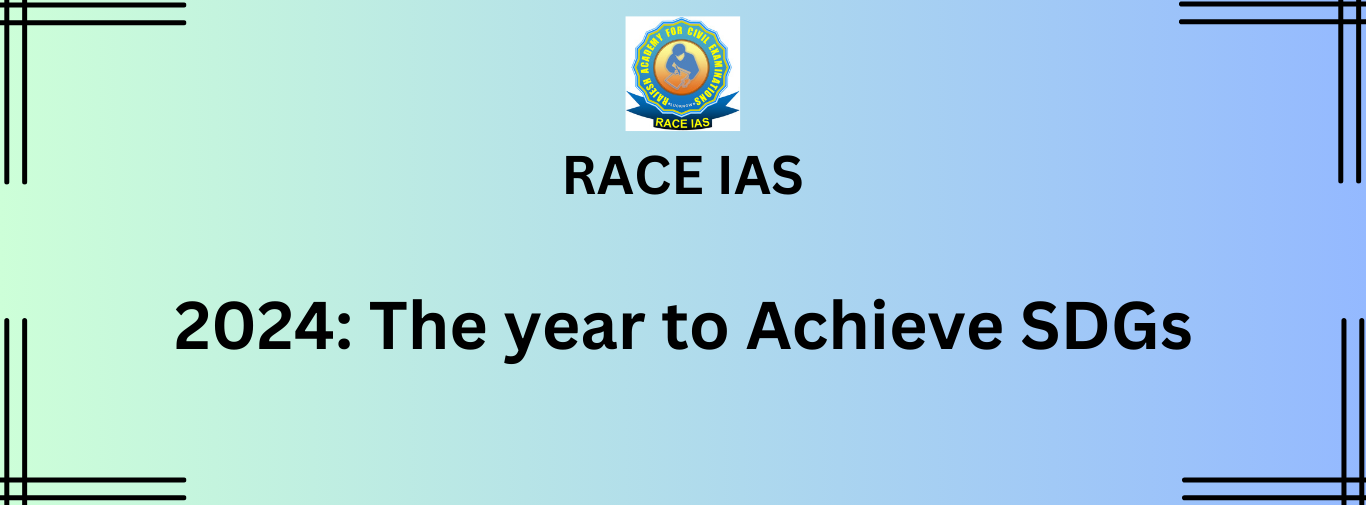
2024: The year to Achieve SDGs
2024: The year to Achieve SDGs
GS-3: Sustainable Development, Issues & Challenges
(IAS/UPPCS)
Relevant for Prelims:
Sustainable Development Sustainable Development Goals (SDGs), Bertrand Commission, Agenda-2030, UN SDG Report-2023.
Relevant for Mains:
Sustainable Development Sustainable Development Goals (SDGs), issues/challenges related to progress in SDGs, way forward, conclusion.
Source: TH
04/05/2024
Context:
2024 is an election year across the world and newly elected governments need to focus on all the important issues related to the Sustainable Development Goals (SDGs).
- We are far from the broader goal of balancing human well-being and a healthy environment. The current trend, if it continues, will accelerate environmental degradation and defeat the purpose of moving towards sustainability.
Sustainable Development Goals (SDGs) Report, 2023:
- Sustainable development is a common global endeavor. The United Nations Summit on Sustainable Development Goals (SDGs), which was held in New York (September 18-19, 2023). In this conference, progress towards achieving SDGs was assessed.
- Agenda-2030, which was adopted by the UN General Assembly in 2015, identified 17 Sustainable Development Goals (SDGs) with 169 specific targets to be achieved by 2030.
- The program is internationally non-binding, but all countries are committed to working towards these goals.
Immediate Action:
- Given this emerging scenario, the UN SDG Report, 2023 identified five key areas for urgent action:
- Ensuring the commitment of governments to seven years of accelerated, sustained and transformative action to deliver on the promises of the SDGs;
- Concrete, integrated and targeted government policies and actions to eradicate poverty, reduce inequality and end the war on nature, with a focus on advancing the rights of women and girls and empowering the most vulnerable;
- Strengthening national and subnational capacity, accountability and public institutions to deliver accelerated progress;
- Recommitment of the international community to provide and mobilize resources to assist developing countries, and to continue strengthening the United Nations development system.
What is Sustainable Development:
Definition:
- According to the report (1987) issued by the Burtland Commission under the ‘World Commission on Environment and Development’ (1983),
- Sustainable development is development done to meet the needs of the present generation without compromising the ability of future generations to meet their needs.
Measuring SDGs Progress:
- According to available reports, SDGs progress is on track, although it has been slow on average.
- From 2015 to 2019, there were some improvements in achieving the SDGs, although not enough to achieve the goals.
Issues/Challenges related to progress in SDGs:
Pandemic:
- Major reasons for non-achievement of Sustainable Development Goals: The outbreak of the COVID-19 pandemic and other global crises.
Lack of commitment:
- Despite commitments, progress towards meeting 169 goals including the 17 SDGs stands at only 15% with some sectors lagging behind.
Inadequacy of Funding:
- The investment gap in achieving the SDGs in developing countries is estimated to exceed US$4 trillion, much larger than previous estimates.
- This huge financial need makes achieving the SDGs impossible, raising questions about the adequacy and accessibility of funding.
Inequalities and Barriers:
- Five inequities have been identified in SDG interventions, including resource allocation, creation of enabling environments, co-benefits, cost-effectiveness and saturation limits.
- Various barriers hinder synergistic action, such as differences in access to information, political and institutional barriers and economic challenges.
Challenges in Policy Implementation:
- Inconsistencies and misalignments in policy implementation due to lack of integration and precise objectives create difficulties, especially in meeting renewable energy targets and small-scale applications.
Climate Change and Environmental Impact:
- Climate change has been identified as a significant challenge that threatens the achievement of the SDG goals. Global greenhouse gas emissions are still increasing, raising concerns about our vulnerability to the impacts of climate change.
Ignoring goals:
- In addition to slow progress, little or no attention was paid to goals related to the environment and biodiversity (including responsible consumption and production, climate action, life below water and life on land).
Way forward:
- Tackling climate change and its environmental impacts must be a priority, requiring coordinated global efforts.
- Multilateral actions and cooperation among nations should be encouraged to make progress in achieving the Sustainable Development Goals.
- Actors must remain committed to the 2030 Agenda, focusing on protecting the rights and well-being of all for a sustainable world.
Conclusion:
There are at least 64 developed and developing countries across the world where 49% of the world's population lives. All these countries should highlight issues related to Sustainable Development Goals in their national policies through newly elected governments in the election year of 2024 so that Agenda 2030 related to Sustainable Development can be achieved.
--------------------------------------------------------
Mains Exam Practice Question:
Critically examine the issues and challenges related to progress in the SDGs in the light of the Sustainable Development Goals (SDGs) Report, 2023.